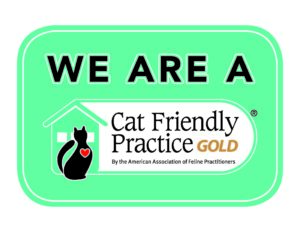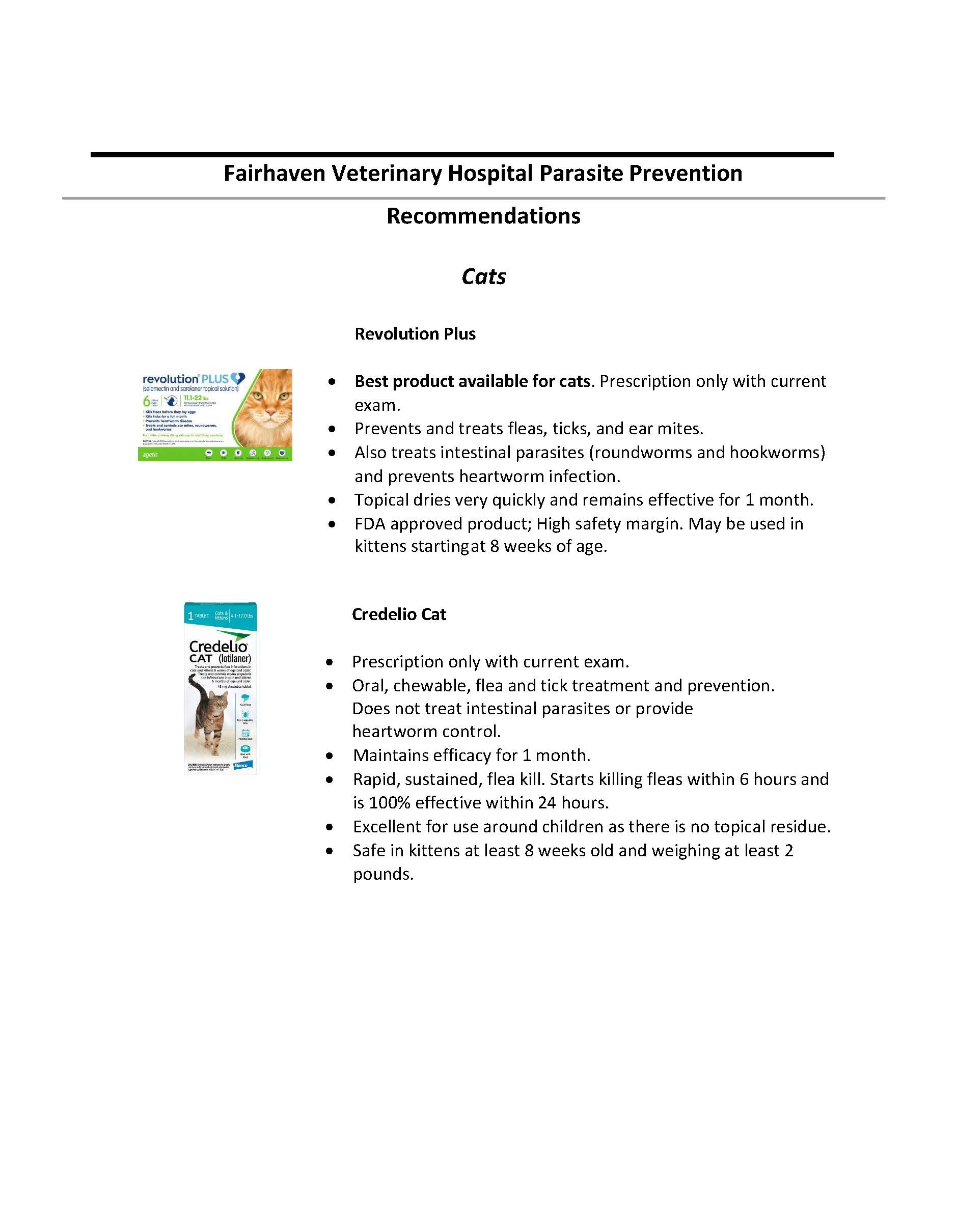 We are proud to be a Cat Friendly Practice!
We are proud to be a Cat Friendly Practice!
KITTEN/CAT CARE RECOMMENDATIONS
Vaccinations: Continue vaccinations every 3-4 weeks until 16 weeks old. The final 2 boosters should be given after 12 weeks of age to ensure a strong immune response.
FeLV/FIV testing: We recommend this simple blood test for all kittens coming from unknown background, or with a mother that has not been tested to ensure that they are not carrying these fatal and highly contagious diseases. Symptoms of these diseases are sometimes not seen until later in life. Feline Leukemia vaccination is recommended for all kittens that may have ANY outdoor exposure, after they have already tested negative.
- Kittens should be routinely dewormed every 2- 4 weeks for at least 4 treatments to eliminate common internal parasites. Please give the Strongid dewormer as prescribed.
- Please bring a fecal sample in the coming week for analysis to ensure all parasites are being treated.
Nutrition and Feeding: Your veterinarian can help you choose a life-stage and condition-appropriate diet for your feline friend. What we feed our cats is very important, but an often-overlooked aspect of cat health is how we feed them. Providing the proper environment for feeding will make your cat happier and help them avoid overfeeding or underfeeding.
- Understanding Your Cat’s Feeding Preferences
- On an instinctual level, cats have certain preferences for feeding that should be considered by caregivers. First, cats prefer to eat multiple small meals throughout the day. Unfortunately, many cats are frequently fed in one location with relatively large volumes of food once or twice a day. Some cats even have food out and available at all times. Both of these can lead to inactivity, obesity, and stress for your cat.
- Cats are Hunters
To help mimic natural feline feeding behaviors and satisfy that instinct, puzzle feeders can also be used. Puzzle feeders hold food and must be handled by the cat to get the food out, which increases activity, and provides mental and physical stimulation. You can learn more about puzzle feeders at foodpuzzlesforcats.com.
For more detailed information on How to Feed Your Cat, download this excellent brochure from our friends at Cat Friendly Homes.
Flea/Parasite Control: Outdoor cats and kittens should have monthly Revolution Plus applied topically to prevent fleas and internal parasites year-round. Indoor-only cats are still able to be infested by fleas travelling into the home through walls (apartments and duplexes), on shoes or clothing and on other pets (dogs or indoor-outdoor cats). Households with young children or immuno-compromised persons are strongly recommended to keep all pets on year-round parasite and flea protection to prevent human health concerns.
Spaying/Neutering: Every year, millions of unwanted dogs and cats, including puppies and kittens, are euthanized. The good news is that responsible pet owners can make a difference. By having your dog or cat sterilized, you will do your part to prevent the birth of unwanted puppies and kittens. Spaying and neutering prevent unwanted litters, help protect against some serious health problems, and may reduce many of the behavioral problems associated with the mating instinct.
Removing a female dog or cat’s ovaries eliminates heat cycles and generally reduces the unwanted behaviors that may lead to owner frustration. Removing the testes from male dogs and cats reduces the breeding instinct, making them less inclined to roam and more content to stay at home.
Early spaying of female dogs and cats can help protect them from some serious health problems later in life such as uterine infections and breast cancer. Neutering your male pet can also lessen its risk of developing benign prostatic hyperplasia (enlarged prostate gland) and testicular cancer.
Dental Care: Healthy adult cats should receive their first comprehensive dental exam and dental cleaning starting at 4 years of age. Your veterinarian will regularly asses your cat’s dental health at each wellness visit and make recommendations for home care or dental cleanings throughout their life.
Permanent Identification: We recommend that a microchip be placed under your kitten’s skin to help ensure that they are rapidly returned to you if ever lost. This can be done at the time of spaying/neutering if being done at 5-6 months of age, or can be done at one of the early kitten visits in animals where spay/neuter is going to be postponed. A microchip is recommended even for kittens that are not intended to go outdoors.
Indoor- only vs. indoor- outdoor lifestyle: We recommend that you consider keeping your cat indoors only. This does reduce risks such as injury from outdoor dangers, poisoning from places or sources not monitored, exposure to contagious diseases and parasites, as well as risks associated with extreme temperatures or weather conditions. However, it is vital to ensure that your cat has an enriched environment which meets their needs to avoid unwanted stressors or behavioral and health concerns. Please speak with your veterinarian for guidance on how to make sure your cat’s emotional, social, and environmental needs are being met. Once you understand the benefits and risks of an indoor-only or indoor/outdoor lifestyle for your cat, you can minimize the risks and maximize the benefits for your cat.
BEHAVIOR
Litterbox training and care: Setting up litterboxes which take species specific needs into account, can greatly improve litterbox training outcomes and reduce stress in the household. Our friends at Feline Behavior Solutions have created these terrific resources for our community.
Scratching behavior and claw care: Scratching is a natural, normal, and necessary behavior for your cat. Your cat does not scratch to upset you or spitefully damage your furniture. Scratching is a form of communication and often your cat will scratch during times of stress and anxiety.
Reasons Cats Scratch
- To renew their nail by dislodging old nail growth and exposing a new, sharper nail underneath.
- To mark their territory visually and with scent (pheromones) as a message to other cats and animals.
- To stretch out their limbs.
Cat Friendly Homes has created an excellent resource page with further detail on setting up ideal scratching options for your home, nail maintenance, and tips to help redirect unwanted scratching behavior.
Playtime: Daily playtime with our cats can greatly increase our own health and happiness, and also give them opportunities to engage in natural behaviors which support their emotional and physical wellbeing. Learn more about playing with your cat for health and happiness here.
Other Resources: Much more information about health and behavior issues can be found at the following websites:
- https://fearfreehappyhomes.com/
- https://catfriendly.com/
- http://www.vet.cornell.edu/fhc/
- You can find links to these sites and other helpful information via our resources tab
FVH Parasite Detection and Prevention Guidelines
DETECTION (Fecal microanalysis)
- Kittens- Test at initial visit and again at 6-18 months of
- Adult Cats- Annual fecal analysis recommended for all patients.
- Fecal analysis recommended whenever abnormal feces or unexplained weight loss
- Cats that frequent a boarding kennel should be tested regularly or as required by the
- Pets on parasite prevention products should still be fecal tested annually to detect Giardia, Coccidia, and other less common parasites that are not cleared by current prevention products.
- Pet guardians should provide a fresh sample in a baggie or small container; generally, a grape sized sample is sufficient. Results are available within 1-3 business days.
PREVENTION (Deworming and Parasite Prevention Products)
- Kittens
- Prophylactic deworm at 2, 4, 6 and 8 weeks of age, then deworm monthly until 6 months of age.
- Adult Cats
- Year round, monthly use of parasite prevention products are recommended for all household pets including outdoor cats, and indoor-only cats that live in a household with dogs or young children (Revolution Plus).
Common parasites to our area (Heartworm is also now an increasing concern for our area):
- Fleas/Ticks– Treat monthly with Revolution Plus, topically, or Credelio Cat, orally. Pets should be treated year-round since our winters are not harsh enough to suppress flea and tick populations. Infestation may lead to allergic dermatitis, anemia, itching and, in rare cases, serious disease for companion animals. Severe infestation may also require treatment of
- Roundworms- Primary route of infection is via mother at birth, direct ingestion via the environment or ingestion of infected vertebrate host. Can occur in cats throughout life. Children and individuals with suppressed immune systems at higher risk for transmission and can lead to serious medical
- Coccidia- Protozoa with primary route of infection coming from contaminated environment or ingestion of contaminated host; People are not considered at risk for transmission. To prevent do not allow ingestion of wild animals and solicit only properly cleaned pet
- Tapeworms- Various species are prevalent and infection typically via ingestion of fleas or contaminated host. Can be a zoonotic, although rarely causes serious human medical
- Giardia- Differing forms affect cats, dogs and people with transmission between groups not currently demonstrated. Infection is through direct fecal-oral contact with cysts or contaminated water source/environment.
- Toxoplasmosis- A very serious zoonotic disease transmitted through the feces of infected cats to humans. Prevention in cats is best achieved by not allowing hunting of wild animals that may be infected, not allowing ingestion of raw or undercooked meat, and daily removal of feces from litter box. Pregnant women and immunosuppressed individuals should avoid cleaning of litter boxes and wear gloves when gardening to avoid exposure to cat feces. Additional recommendations are available at capcvet.org.


